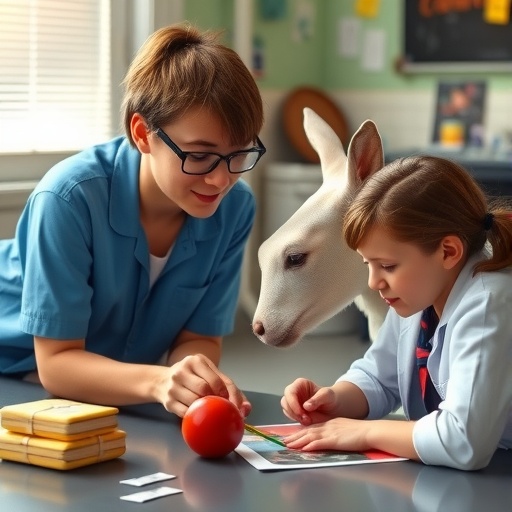In an era where ethical considerations surround scientific endeavors, a recent study sheds light on the attitudes of adolescents towards animal experimentation. Conducted by researchers Enzinger-Mühlbacher and Dürnberger, the exploration aims to understand the evolving perceptions of young individuals in the context of socio-scientific issues. The researchers embarked on a comprehensive analysis focused on how these attitudes are formed and what underlying factors influence them. The significance of such research is paramount, as it enables educators to better navigate difficult discussions regarding science and ethics.
The landscape of animal experimentation has long been a contentious issue, with implications spanning ethical, scientific, and social domains. Adolescents, a group often unrepresented in the discourse, have insights that can inform broader societal debates. This demographic is facing increased exposure to ethical dilemmas posed by media, education, and social interactions. Such environments cultivate diverse opinions, making it essential to examine their attitudes in a structured research context to drive impactful discussions.
In this study, the researchers utilized a mixed-methods approach, blending quantitative and qualitative data to draw comprehensive conclusions. High school students participated in surveys and focus group discussions, providing a rich dataset that highlights their views on animal rights, scientific progress, and moral considerations. Through this methodology, the researchers were able to observe not only the stated attitudes of adolescents but also their reasoning processes, revealing how deeply rooted their beliefs are in personal and societal influences.
One of the critical findings from the study indicates that many adolescents display a nuanced understanding of animal ethics that extends beyond simple pro- or anti-animal experimentation stances. These students often articulate their thoughts in cognitive frameworks that consider both ethical considerations and the scientific justifications for using animals in research. This duality underscores a maturity in perspective that researchers had previously overlooked in younger populations.
Conversations within focus groups revealed that many students feel conflicted about animal experimentation. While they recognize its role in advancing medical knowledge, they are also deeply empathetic towards animals and troubled by the suffering that may result from such experiments. This empathy often intersects with discussions about alternative methodologies, leading to a growing interest in issues like in vitro research and computer simulations. The awareness of alternatives highlights an emerging trend among adolescents to seek ethical solutions that align scientific inquiry with compassion towards living beings.
Moreover, the socio-cultural backgrounds of the participants played a significant role in shaping their attitudes. Students from households with strong animal rights beliefs tended to be more skeptical of animal experimentation, while those from a scientific or medical family background often supported it, albeit with critical caveats. This intersection of family influence and educational experience is crucial in comprehending why adolescents adopt certain positions regarding complex socio-scientific issues.
Interestingly, the data revealed a significant difference in attitudes based on educational exposure to the topic. Participants who had previously engaged in science classes that discussed ethical ramifications displayed a higher degree of introspection and critical thinking regarding animal research. The impact of education is apparent; well-informed individuals are more likely to grapple thoughtfully with ethical considerations rather than accepting normative practices at face value.
The study also captures the digital landscape’s effect on attitudes towards animal experimentation. With social media platforms abuzz with discussions around animal rights and ethical considerations, adolescents are increasingly exposed to diverse viewpoints. The online world serves as a double-edged sword; it can foster empathy and awareness but can also lead to misinformation and polarizing ideologies. Engaging with various narratives significantly influences how adolescents perceive the interplay between ethical considerations in science and animal welfare.
Educators and policymakers must acknowledge these insights as they develop curricula that tackle socio-scientific issues. The increasing complexity of parental pressures, cultural norms, and scientific literacy demand a pedagogical shift that fosters critical thinking. By integrating discussions of animal ethics into broader science education, schools have the unique opportunity to cultivate informed citizens capable of navigating these challenging landscapes.
Furthermore, bridging the gap between scientific communities and young citizens entails creating dialogues that are accessible and relatable. Interactive programs that involve students in discussions with scientists can demystify scientific processes and ethical concerns. Such initiatives can provide adolescents with tangible examples and firsthand insights, allowing them to critically analyze animal experimentation practices in relatable contexts.
The implications of the research extend into future generations of scientists and educators. Understanding adolescents’ perspectives on animal experimentation shapes how future research ethics could be approached, ensuring that these young voices are considered in the ongoing discourse. By valuing their insights, the scientific community can aim toward a more ethically diverse approach to research methodologies.
In conclusion, Enzinger-Mühlbacher and Dürnberger’s study uncovers essential facets of adolescent perceptions on animal experimentation, showcasing a spectrum of attitudes shaped by educational exposure, familial influences, and socio-cultural dynamics. As society continues to grapple with complex ethical dilemmas surrounding animal use in research, the insights gained from this research can catalyze change in science education and inform ethical standards for future scientific practice.
For researchers and educators alike, the challenge lies in fostering an environment where adolescents feel empowered to express their thoughts on animal ethics. Encouraging these discussions can lead to enhanced understanding and empathy towards both scientific endeavors and animal welfare. Ultimately, in raising a generation that values ethical considerations, the potential for more compassionate scientific progress is boundless.
Subject of Research: Adolescents’ attitudes and ethical orientations towards animal experimentation
Article Title: Exploring adolescents’ attitudes and animal ethics orientations in a socio-scientific issues context: insights from a study on animal experimentation
Article References:
Enzinger-Mühlbacher, S.M., Dürnberger, C. Exploring adolescents’ attitudes and animal ethics orientations in a socio-scientific issues context: insights from a study on animal experimentation.
Discov Educ 4, 367 (2025). https://doi.org/10.1007/s44217-025-00712-2
Image Credits: AI Generated
DOI:
Keywords: Adolescent attitudes, animal ethics, animal experimentation, socio-scientific issues, education, mixed-methods approach, ethical consideration, empathy, scientific literacy, digital influence.




